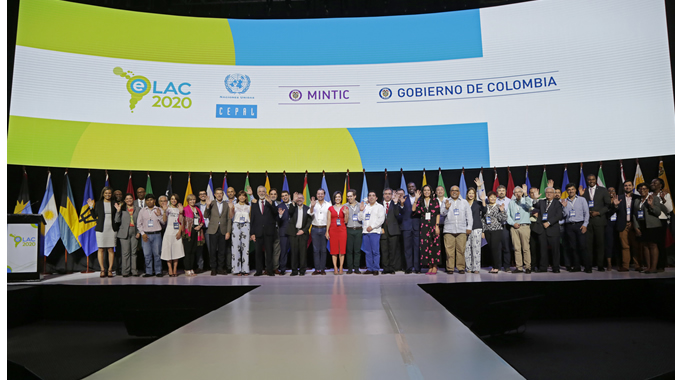Countries of Latin America and the Caribbean Commit to Spearheading the Digital Ecosystem, E-Commerce, Access to Public Information and Protection of Privacy
 With the Cartagena Declaration, approved at the end of the Sixth Ministerial Conference on the Information Society, the region agrees to the 2020 Digital Agenda to achieve sustainable development with equality.
With the Cartagena Declaration, approved at the end of the Sixth Ministerial Conference on the Information Society, the region agrees to the 2020 Digital Agenda to achieve sustainable development with equality.
With the Cartagena Declaration adopted today in Colombia, the countries of Latin America and the Caribbean approved the eLAC 2020 Digital Agenda, which seeks regional cooperation to continue moving forward on inclusion, the digitalization of production, skills development among the population, as well the promotion of open government and governance that stimulates collaboration between countries.
The Declaration was approved in the framework of the Sixth Ministerial Conference on the Information Society of Latin America and the Caribbean, which came to a close today. Colombia was selected to preside over the eLAC conference for the 2018-2020 period. In 2019, Ecuador will be the headquarters of the Preparatory Meeting leading up to the Seventh Ministerial Conference to be held in Brazil in 2020.
In congratulating Colombia for having been chosen to preside over the eLAC process for the next two years, Mario Cimoli, acting Deputy Executive Secretary for the Economic Commission for Latin American and the Caribbean, on behalf of Executive Secretary Alicia Bárcena, underscored how important it is for the region’s governments to assume the digital agenda as State policy with coordination from the highest level, given that information technologies and communications are a profound change in forms of production, communication and human relations that cannot be viewed in isolation.
Cimoli emphasized the importance of integration and collaboration among countries to form large markets and thus enable the development of solutions that integrate small- and medium-sized enterprises. From there, the importance of creating spaces for internet governance that promotes gender equality, prevents cybercrime, reinforces regional mechanisms and generates synergies, in addition to promoting regulatory and institutional harmony, privacy and personal data protection.
“Development is unthinkable without new technologies, which is why this work on the regional digital agenda is so important,” he said.
The Colombian Minister of Information Technologies and Communications, David Luna, said that his country assumes the eLAC presidency with enthusiasm and thanked the alliance with ECLAC in its new responsibilities.
“In eLAC, we are demanding about personal data protection and will work together as States for that respect to become a reality,” assured Luna.
The eLAC 2020 Digital Agenda adopted by the countries is organized into seven areas of action: digital infrastructure; digital transformation and digital economy; digital government; culture, inclusion and digital skills; emerging technologies for sustainable development; the regional digital market; and governance for the information society.
In infrastructure, the countries agreed to promote public policies to develop broadband systems and viable alternatives for local and community access to networks. In digital transformation and the digital economy, special focus was placed on support for MSMEs and entrepreneurship. They also agreed to promote open government initiatives and encourage digital service standards that facilitate government services.
In culture, inclusion and digital skills, they proposed updating curricular content to prepare students and citizens to take on the challenges of the digital economy; the strengthening of big data analysis and massive expansion of access to digital services. As for action on emerging technologies for sustainable development, the countries agreed to promote digital financial services as a priority for developing inclusive financial systems.
Moreover, the countries expressed their rejection of the unauthorized collection and improper use of personal data and agreed to promote appropriate mechanisms for the treatment of such data.
The countries decided to continue developing a strategy for a regional digital market to increase cross-border e-commerce. In addition, they expressed the need for digital policies that leverage emerging technologies coming out of the digital revolution and their impact on the economy and welfare.






